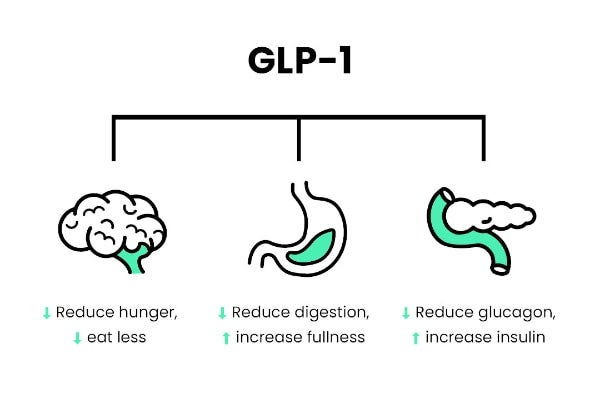Embarking upon a journey towards better health can often appear formidable, particularly when navigating through the complex landscape of treatments and medications available. In this context, Ozempic, Wegovy, and their counterparts such as Mounjaro, have risen to prominence, acclaimed not solely for their efficacy in combating diabetes and obesity but also for potentially broader benefits.
The conversation has evolved beyond mere weight reduction and blood sugar management. There is an increasing volume of research suggesting that these medications may extend their utility to encompass a wider array of health benefits. Beyond the expected outcomes, these drugs may serve as versatile tools in your health management repertoire, addressing various conditions previously unconsidered.
Let us explore how these pharmaceutical innovations could signify more than a singular solution in your pursuit of health.
Heart attack and stroke
Glucagon-like peptide-1 receptor agonists (GLP-1 RA) offer significant benefits in reducing the risk of heart attack and stroke for patients with type 2 diabetes. Research suggests these benefits include a 14% relative risk reduction for major cardiovascular events, such as cardiovascular death, heart attack, and stroke, when compared to placebo. GLP-1 RAs have been shown to reduce the likelihood of having a stroke, heart attack, or dying due to cardiovascular causes by 12%, along with a similar reduction in overall mortality. Studies have demonstrated that GLP-1 RAs lead to weight loss, reduced appetite, enhanced fullness, and improved insulin sensitivity, all contributing to positive cardiovascular effects like lowering blood pressure and improving lipid profiles. Additionally, GLP-1 RAs have been reported to have anti-inflammatory and antiatherogenic effects that reduce the formation of atherosclerotic lesions and progression.
The FDA has approved semaglutide, a GLP-1 RA, for a new indication involving cardiovascular disease. Semaglutide, marketed as Wegovy, is now approved to reduce the risk of cardiovascular death, heart attack, and stroke in adults with both cardiovascular disease and overweight or obesity. This approval marks Wegovy as the first weight-loss medication approved for this specific purpose, emphasising its role in cardiovascular risk management for individuals with these conditions.
Kidney diseases
GLP-1 receptor agonists have shown significant benefits for kidney diseases in research. These benefits include reducing albuminuria, slowing the decline in estimated glomerular filtration rate (eGFR), and potentially preventing the progression to end-stage renal disease (ESRD). GLP-1 RA have been shown to have renoprotective effects through various mechanisms such as natriuresis, diuresis, inhibition of oxidative stress, and inflammation. They also have shown to improve conventional risk factors for diabetic kidney disease (DKD) like blood glucose levels, blood pressure, and body weight. Additionally, GLP-1 receptor agonists may reduce the risk of worsening kidney functions.
These findings underscore the promising role of GLP-1 receptor agonists in managing kidney diseases, particularly in patients with type 2 diabetes who are at high risk for cardiovascular disease. The ongoing research and clinical trials continue to explore the full extent of the benefits of GLP-1 receptor agonists on kidney outcomes, emphasising their potential as a valuable therapeutic option for patients with diabetic kidney disease.

Alzheimer’s disease
GLP-1 drugs have shown promise in the treatment of Alzheimer's disease by targeting various mechanisms associated with the disease. Research indicates that GLP-1 analogs, such as liraglutide, can prevent the decline of brain glucose metabolism (CMRglc) in Alzheimer's patients, potentially halting the progression of memory decline. These drugs have been found to stimulate insulin secretion, promote β-cell growth and differentiation, inhibit cell apoptosis, and protect against excitotoxic cell death and toxic effects of Aβ1-42. GLP-1 analogs also exhibit neuroprotective effects by reducing neuroinflammation, oxidative stress, amyloid plaque deposition, and tau hyperphosphorylation in animal models of Alzheimer's disease.
Moreover, GLP-1 receptor agonists have been associated with increased cerebral glucose metabolism, improved clinical outcomes, and enhanced cortical circuitry in patients with Alzheimer's disease. Studies suggest that these drugs may reverse early and late events in neurodegeneration, potentially offering a novel approach to treating the disease beyond symptomatic relief. The ability of GLP-1 drugs to cross the blood-brain barrier and exert beneficial effects on brain glucose transport and metabolism further supports their therapeutic potential in Alzheimer's disease.
Colon cancer
GLP-1 receptor agonists (GLP-1RAs) have shown promise in reducing the risk of colorectal cancer (CRC) in patients with type 2 diabetes. Research indicates that GLP-1RAs, such as liraglutide, can lower the incidence of colon and rectal cancers compared to a placebo. These medications are known to delay gastrointestinal motility, which can impact the quality of bowel preparation for colonoscopies. Studies have demonstrated that GLP-1RAs are more effective than other anti-diabetic drugs like Metformin or insulin in preventing the development of CRC. GLP-1RAs have been found to reduce the risk of CRC by regulating PI3K/AKT/mTOR signalling in colorectal cancer cells.
Substance use
GLP-1 has shown promising benefits in substance use disorders. Research indicates that GLP-1 receptor agonists, such as semaglutide, may have a role in treating alcohol use disorder and other substance use disorders by potentially reducing the rewarding properties of addictive drugs. Studies suggest that GLP-1 can reduce alcohol and drug intake, with clinical trials underway to explore these findings further. However, it is emphasised that while the data on GLP-1 receptor agonists are promising, it is not recommended to prescribe them off-label for substance and alcohol use disorders until more randomised controlled trials (RCTs) confirm their efficacy and safety.
Furthermore, GLP-1 is associated with lower incidence of alcohol-related events in individuals who initiate treatment with GLP-1 receptor agonists compared to other treatments like DPP4. This suggests a potential transient preventive effect of GLP-1 on alcohol-related events in the initial months after treatment initiation.
Conclusion
The exploration of Ozempic, Wegovy, Mounjaro and similar GLP-1 receptor agonists has illuminated a promising path toward enhancing health outcomes beyond their primary roles in diabetes and obesity management. These medications stand on the brink of revolutionising treatment protocols for a spectrum of conditions, demonstrating significant potential in kidney disease management, cardiovascular health improvement, Alzheimer’s disease treatment, colorectal cancer risk reduction, and even in addressing substance use disorders.
Their ability to influence various biochemical pathways has opened new avenues for research, suggesting that their impact could stretch far wider than initially anticipated. While the current findings underscore their multifaceted utility, it is crucial to approach their expanded use with caution, emphasising the need for ongoing research and rigorous clinical trials to fully understand their efficacy, safety, and long-term effects across these diverse medical domains. The emergence of GLP-1 receptor agonists as versatile tools in health management marks a significant advancement, heralding a future where treatment options are not only more effective but also more attuned to the complexities of human health.



